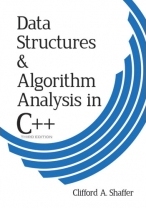
Data Structures & Algorithm Analysis in C++ (Edition 3.2.0.10)
This book provides a thorough and comprehensive treatment of fundamental data structures and the principles of algorithm analysis. Focuses on the principles required to select or design the data structure that will best solve the problem.
Publication date: 28 Mar 2013
ISBN-10: 048648582X
ISBN-13: 9780486485829
Paperback: 615 pages
Views: 74,135
Data Structures & Algorithm Analysis in C++ (Edition 3.2.0.10)
 This book provides a thorough and comprehensive treatment of fundamental data structures and the principles of algorithm analysis. Focuses on the principles required to select or design the data structure that will best solve the problem.
This book provides a thorough and comprehensive treatment of fundamental data structures and the principles of algorithm analysis. Focuses on the principles required to select or design the data structure that will best solve the problem.
Publication date: 28 Mar 2013
ISBN-10: 048648582X
ISBN-13: 9780486485829
Paperback: 615 pages
Views: 74,135
Document Type: N/A
Publisher: Dover Publications
License: n/a
Post time: 20 Jul 2010 01:21:28
Clifford A. Shaffer wrote:This document is made freely available for educational and other non-commercial use. You may make copies of this file and redistribute it without charge. You may extract portions of this document provided that the front page, including the title, author, and this notice are included. Any commercial use of this document requires the written consent of the author.
Excerpts from the Preface:
Clifford A. Shaffer wrote:We study data structures so that we can learn to write more efficient programs. But why must programs be efficient when new computers are faster every year? The reason is that our ambitions grow with our capabilities. Instead of rendering efficiency needs obsolete, the modern revolution in computing power and storage capability merely raises the efficiency stakes as we computerize more complex tasks.
The quest for program efficiency need not and should not conflict with sound design and clear coding. Creating efficient programs has little to do with "programming tricks" but rather is based on good organization of information and good algorithms. A programmer who has not mastered the basic principles of clear design is not likely to write efficient programs. Conversely, "software engineering" cannot be used as an excuse to justify inefficient performance. Generality in design can and should be achieved without sacrificing performance, but this can only be done if the designer understands how to measure performance and does so as an integral part of the design and implementation process. Most computer science curricula recognize that good programming skills begin with a strong emphasis on fundamental software engineering principles. Then, once a programmer has learned the principles of clear program design and implementation, the next step is to study the effects of data organization and algorithms on program efficiency.
Tweet
About The Author(s)
Cliff Shaffer is Professor of Computer Science at Virginia Tech, where he has been since 1987. He received his PhD from University of Maryland in 1986. Over his career, Dr. Shaffer's research efforts have spanned three major themes: Data structures and algorithms for spatial applications, integrated problem-solving environments for engineering and science applications (most notably for systems biology), and simulation and visualization for education (including Computer Science, Statistics, and Geography).

Cliff Shaffer is Professor of Computer Science at Virginia Tech, where he has been since 1987. He received his PhD from University of Maryland in 1986. Over his career, Dr. Shaffer's research efforts have spanned three major themes: Data structures and algorithms for spatial applications, integrated problem-solving environments for engineering and science applications (most notably for systems biology), and simulation and visualization for education (including Computer Science, Statistics, and Geography).